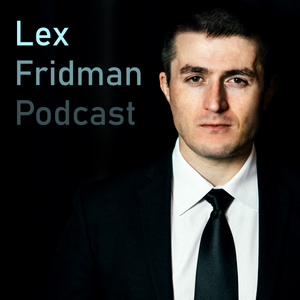
Ep. 9 | Interdisciplinary Collaborations: How Research Benefits From a Little Bit of Chaos
06/29/22 • 31 min
In this episode, we talk with Dr. Farshid Guilak, who was recently elected into the National Academy of Engineering for his contributions to regenerative medicine and mechanobiology. Dr. Guilak is both the Mildred B. Simon Professor of Orthopedic Surgery and co-director of the Center for Regenerative Medicine at Washington University in St. Louis. Throughout his career, Dr. Guilak has pursued interdisciplinary collaborations that create just enough chaos, and maybe a little art in the process.
__________
Dr. Farshid Guilak, Mildred B. Simon Professor of Orthopedic Surgery and co-director of the Center for Regenerative Medicine at Washington University in St. Louis
Dr. Farshid Guilak pursues a multidisciplinary approach in his laboratory to investigate the role of biomechanics and mechanobiology in the etiology and pathogenesis of various musculoskeletal diseases – particularly osteoarthritis – as a basis for developing and translating new tissue-engineering therapies. His current research studies focus on the use of novel genome engineering methods for reprogramming stem cells to create functional tissue replacements for regenerating musculoskeletal tissues.
https://twitter.com/guilak_lab?lang=en
https://www.linkedin.com/in/farshid-guilak-477817b8/
__________
Hosted by Polyplexus, Talk Polymath is a monthly podcast series, featuring evidence-based conversations with current and emerging thought leaders in science, technology, engineering, the arts, and math. From public health to changing models and trends in technology, this podcast engages in topics of current interest across disciplines.
For more information visit www.polyplexus.com.
In this episode, we talk with Dr. Farshid Guilak, who was recently elected into the National Academy of Engineering for his contributions to regenerative medicine and mechanobiology. Dr. Guilak is both the Mildred B. Simon Professor of Orthopedic Surgery and co-director of the Center for Regenerative Medicine at Washington University in St. Louis. Throughout his career, Dr. Guilak has pursued interdisciplinary collaborations that create just enough chaos, and maybe a little art in the process.
__________
Dr. Farshid Guilak, Mildred B. Simon Professor of Orthopedic Surgery and co-director of the Center for Regenerative Medicine at Washington University in St. Louis
Dr. Farshid Guilak pursues a multidisciplinary approach in his laboratory to investigate the role of biomechanics and mechanobiology in the etiology and pathogenesis of various musculoskeletal diseases – particularly osteoarthritis – as a basis for developing and translating new tissue-engineering therapies. His current research studies focus on the use of novel genome engineering methods for reprogramming stem cells to create functional tissue replacements for regenerating musculoskeletal tissues.
https://twitter.com/guilak_lab?lang=en
https://www.linkedin.com/in/farshid-guilak-477817b8/
__________
Hosted by Polyplexus, Talk Polymath is a monthly podcast series, featuring evidence-based conversations with current and emerging thought leaders in science, technology, engineering, the arts, and math. From public health to changing models and trends in technology, this podcast engages in topics of current interest across disciplines.
For more information visit www.polyplexus.com.
Previous Episode

Ep. 8 | The Social Impact of Algorithmic Fairness
In this episode, we talk with Peter Bergman and Sara Nadel of Learning Collider (https://www.learningcollider.org/), a research lab on a mission to accelerate socio-behavioral research to identify technology interventions that fight inequality. The lab partners with large-scale technology companies and organizations to access the high-dimensional data they collect, then use these massive data sets to assess discrimination and biases that impact hiring, loan decisions, and educational opportunities. They can then build, test, and rapidly scale applications of machine learning and AI that promote algorithmic fairness, and socioeconomic equity.
__________
Peter Bergman, Founder & President, Learning Collider
Peter Bergman is an international expert in economics, behavioral economics, and machine learning. He is an Associate Professor of Economics at the University of Texas, Austin, Co-Editor for the Journal of Public Economics, and Co-Chair of the Education Technology Initiative at the Abdul Latif Jameel Poverty Action Lab (J-PAL) at MIT.
https://twitter.com/peterbergman_
https://www.linkedin.com/in/peter-bergman-675302219/
Sara Nadel, Chief Operating Officer, Learning Collider
Prior to joining Learning Collider, Sara generated over one million dollars in additional wages for frontline workers as a Co-founder of StellarEmploy, a predictive analytics platform for hiring an inclusive, diverse workforce. She holds a Ph.D. from Harvard’s Kennedy School of Public Policy and was an Emerson Collective Dial Fellow for her work in labor market innovation.
https://twitter.com/nadelsara
https://www.linkedin.com/in/saranadel/
__________
Talk Polymath is Polyplexus.com's monthly podcast series which features evidence-based conversations and invites global science leaders to converse about topics in science, technology, engineering, the arts, and math. From public health to changing models and trends in technology, this podcast engages in current cultural interests across disciplines.
For more information visit www.polyplexus.com.
Next Episode

Ep. 10 | Solving Climate Change on Earth: Sensing Technologies, Ocean Exploration, and Scientific Collaboration
Ep. 10 | Solving Climate Change on Earth: Sensing Technologies, Ocean Exploration, and Scientific Collaboration
In this episode we talk with Pablo Sobron, Founder/Sensing Wizard at Impossible Sensing, and Research Scientist at the SETI Institute. Pablo discusses new sensing technologies that will map the ocean floor, and other harsh environments where these technologies can be applied to inform innovative climate change solutions. Listen to how his team of thinkers, engineers, and scientists create, apply, and interpret research and development to help address climate change on Earth.
__________
Dr. Pablo Sobron
Founder/Sensing Wizard at Impossible Sensing and Research Scientist at the SETI Institute
Dr. Pablo Sobron leads a team of scientists and engineers at Impossible Sensing in building sensors to explore and study the deep sea and deep space. Their innovations in optics and deep analytics are used to search for life on other planets and resources on the Moon, survey biodiversity and clean-tech minerals in the seafloor, measure and eliminate greenhouse gas emissions in the energy sector, introduce climate-smart land management practices, and monitor indicators of climate change at global scale. As a Research Scientist at the SETI Institute, Sobron is helping NASA develop a roadmap for the next decades of Astrobiology and Planetary Science.
https://www.linkedin.com/in/psobron/
https://www.impossiblesensing.com/
__________
Hosted by Polyplexus, Talk Polymath is a monthly podcast series, featuring evidence-based conversations with current and emerging thought leaders in science, technology, engineering, the arts, and math. From public health to changing models and trends in technology, this podcast engages in topics of current interest across disciplines. For more information visit www.polyplexus.com
If you like this episode you’ll love
Episode Comments
Generate a badge
Get a badge for your website that links back to this episode
<a href="https://goodpods.com/podcasts/talk-polymath-evidence-based-conversations-223213/ep-9-interdisciplinary-collaborations-how-research-benefits-from-a-lit-25431093"> <img src="https://storage.googleapis.com/goodpods-images-bucket/badges/generic-badge-1.svg" alt="listen to ep. 9 | interdisciplinary collaborations: how research benefits from a little bit of chaos on goodpods" style="width: 225px" /> </a>
Copy




